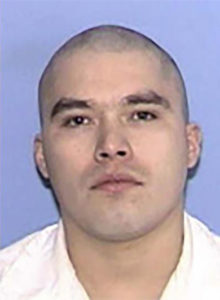A South Texas district attorney has withdrawn the death warrant his office issued for the execution of a death row inmate whose case led to the recent ruling allowing spiritual advisers to lay hands on and pray for a prisoner in the execution chamber.

Nueces County DA Mark Gonzalez took action to stop the scheduled execution of John Henry Ramirez, who was convicted of the 2004 robbery and murder of a convenience store clerk.
Gonzalez filed the motion April 14 to withdraw the order setting Ramirez’s execution, saying he “has the firm belief that the death penalty is unethical and should not be imposed on Mr. Ramirez or any other person.”
The 94th District Court on April 12 had set Oct. 5 as the execution date for Ramirez, and the Nueces County district clerk signed a death warrant that same day.
The motion Gonzalez filed notes the assistant district attorney who had moved for an execution date in the case “was not aware of [the DA’s] desire in this matter and did not consult” him prior to his action.
Last month, the U.S. Supreme Court ruled in favor of Ramirez in a key religious liberty case.
In an 8-1 decision in Ramirez v. Collier, the court ruled the state should accommodate the inmate’s request to have his pastor lay hands on him and audibly pray for him at the moment of his execution.
Ramirez had asked prison officials to allow Pastor Dana Moore of Second Baptist Church in Corpus Christi to be present in the death chamber to touch him and pray for him in the execution chamber. The Texas Department of Criminal Justice denied the request, citing security concerns.
Moore has ministered to Ramirez on Texas Death Row as his spiritual adviser about five years. After Ramirez made a profession of faith in Christ in prison, Second Baptist Church allowed him to join its membership.
Citing provisions of the Religious Land Use and Institutionalized Persons Act of 2000, the Supreme Court determined it was unlikely the state could demonstrate “a compelling government interest” in refusing the inmate’s request for a religious accommodation or that its refusal was the “least restrictive means of furthering compelling government interest.”
Distinguished from Lucio case
In an April 19 interview with the Texas Standard news program on Texas Public Radio, Gonzalez noted he did not oppose capital punishment when he first took office, but he came to that position based on what he has learned about “how the death penalty is carried out.”
“If I am against the death penalty and I won’t be seeking the death penalty, I think it would be pretty hypocritical of me to set a date of execution,” Gonzalez said.

He distinguished the Ramirez case from another high-profile death penalty case involving Melissa Lucio, who is scheduled to be executed April 27 for the murder of her 2-year-old daughter.
In the Lucio case, new evidence not presented at trial included declarations from seven scientific and forensic experts who concluded false evidence misled the jury into believing the child was killed by physical abuse rather than medical complications after a fall.
The application for clemency filed with Gov. Greg Abbott and the Texas Board of Pardons and Paroles also documents that Lucio—a survivor of abuse—asserted her innocence more than 100 times before she finally affirmed statements presented by officers after five hours of “coercive interrogation.”
“There are some real questions regarding some of the details surrounding her case,” Gonzalez told the Texas Standard. “In Mr. Ramirez’s case, there’s no question. I mean, he’s guilty. He did what he did. He’s acknowledged it. He’s shown remorse.
“Still, it’s up to me to ask for that date of execution. … I just decided I wouldn’t be a part of it. … I just don’t feel that the government should have the right to end life.”















We seek to connect God’s story and God’s people around the world. To learn more about God’s story, click here.
Send comments and feedback to Eric Black, our editor. For comments to be published, please specify “letter to the editor.” Maximum length for publication is 300 words.